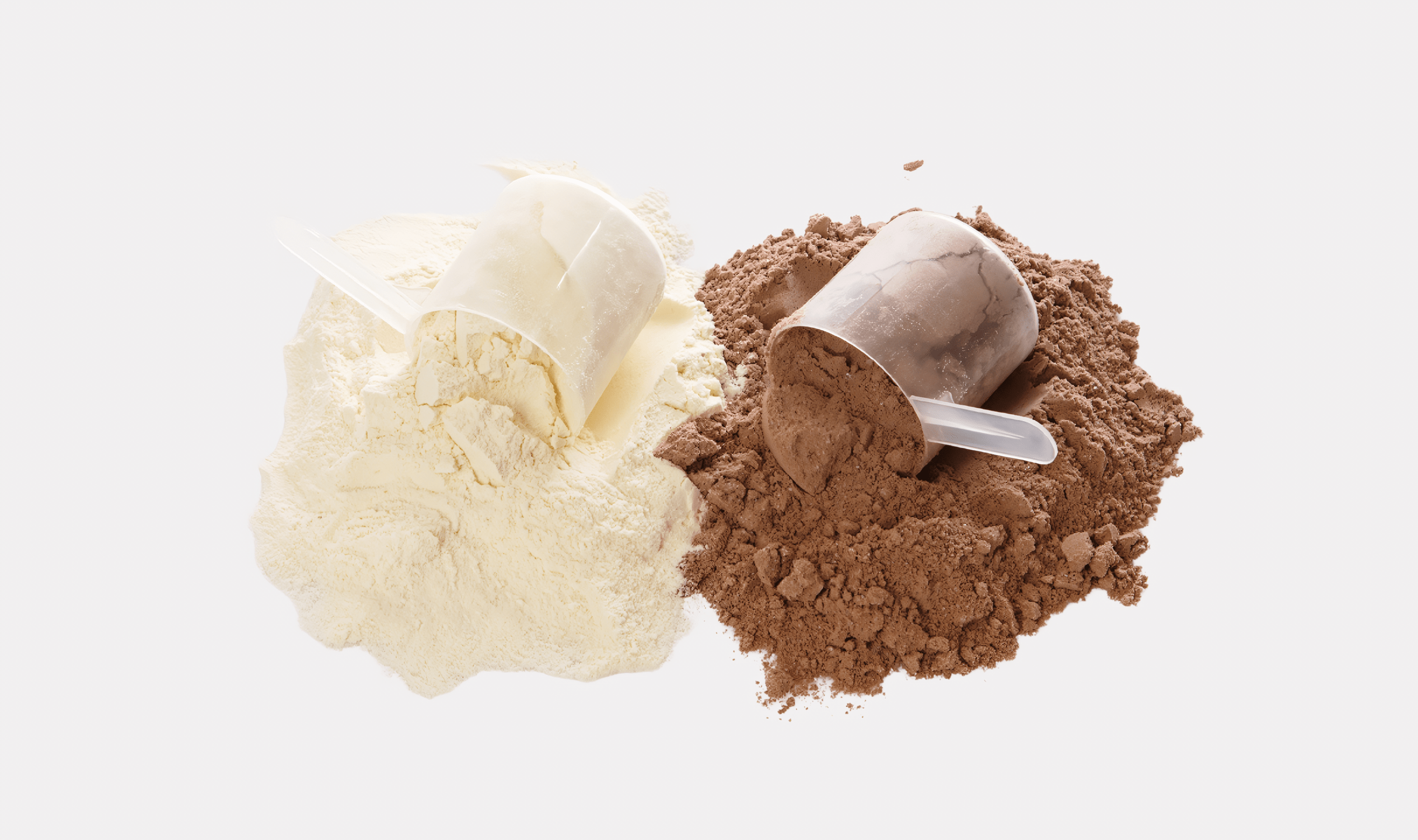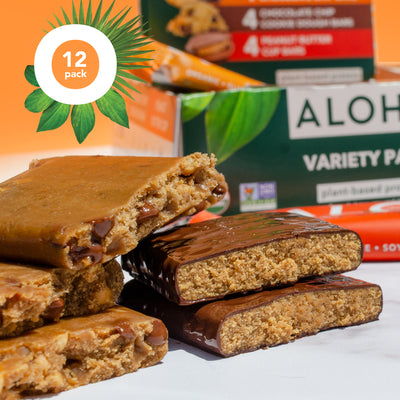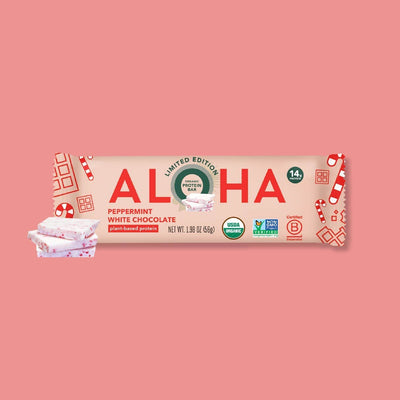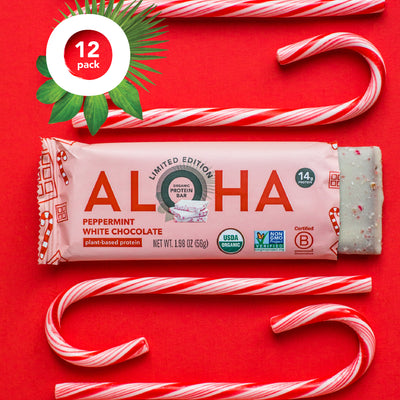Key Takeaways:
- Proper Storage is Essential: Storing protein powder in a cool, dry place and sealing it tightly can significantly extend its shelf life.
- Watch for Spoilage Signs: Changes in smell, texture, or flavor are vital indicators that your protein powder may no longer be safe to consume.
- Plant-Based Powders Have an Edge: Due to their ingredients, plant-based protein powders often last longer than dairy-based ones, but proper handling is still crucial.
At ALOHA, we pride ourselves on crafting premium, plant-based protein powders that are USDA Organic and Non-GMO Project Verified. Our commitment to quality ensures that each scoop supports your wellness journey with clean, sustainable nutrition.
Understanding the shelf life of protein powder is essential for maintaining its freshness and effectiveness. Proper storage and handling can significantly extend its usability, allowing you to make the most of your investment in health.
In this article, we'll explore the factors that influence protein powder longevity, provide tips for optimal storage, and help you identify signs of spoilage. By the end, you'll be equipped with the knowledge to keep your protein powder fresh and beneficial for longer.
Understanding Protein Powder Expiration Dates
Protein powder expiration dates can be a bit confusing, but they’re there to help you make the best choice for your health. Typically, you’ll find a “best by” or “use by” date printed on the container. These dates indicate when the product is at its peak quality, not necessarily when it becomes unsafe.
It’s good to note that protein powders—especially plant-based ones like ALOHA—don’t spoil as quickly as fresh foods. Thanks to their dry, powdered form, they can often remain safe for use even after the printed date as long as they’re stored properly. However, you might notice flavor, texture, or nutritional value changes over time.
Factors That Affect Protein Powder Shelf Life
The longevity of your protein powder isn’t just about the expiration date—it’s also about how you store and handle it. Understanding the key factors influencing freshness ensures every scoop delivers the nutrition and flavor you expect. Here’s what you need to know:
- Exposure to Air: Once you open your protein powder container, it’s exposed to oxygen, which can cause oxidation. This process may degrade the nutrients and alter the taste of your powder over time. Keeping the lid tightly sealed after each use is one of the easiest ways to maintain freshness.
- Moisture and Humidity: Moisture is a protein powder’s worst enemy, as it can lead to clumping and even mold growth. Storing your powder in a dry place—away from the kitchen sink or other humid areas—helps prevent spoilage. Consider using a moisture-absorbing packet if your area is particularly humid.
- Heat and Temperature Changes: High temperatures can speed up nutrient degradation, affecting the quality and effectiveness of your protein powder. Store your container away from heat sources, like ovens or direct sunlight, to preserve its integrity. A cool, stable environment is ideal for keeping your powder fresh.
- Light Exposure: Prolonged exposure to light, especially sunlight, can damage the natural ingredients in your protein powder. This is why many powders are packaged in opaque or dark containers. Always store your powder in a cupboard or pantry with minimal light exposure to protect it.
How To Properly Store Protein Powder
Storing protein powder correctly can significantly extend its shelf life and preserve its quality. Following simple guidelines, you can keep your powder fresh, flavorful, and effective for longer. Here’s how to make sure your ALOHA protein powder stays in peak condition:
Store In A Cool, Dry Place
Temperature and humidity are two of the biggest threats to maintaining the shelf life of protein powder. Excess heat or moisture can lead to nutrient degradation and affect the texture and taste of the powder. Store your protein powder in a pantry, cupboard, or another cool, dry spot away from heat sources like stoves or direct sunlight for best results.
Keep The Container Sealed Tightly
Every time the container is opened, air and moisture have the opportunity to enter, speeding up the spoilage process. To prevent this, always close the lid tightly after use or consider transferring the powder to an airtight container for added security. Keeping the powder well-sealed preserves its quality and extends its usable life.
Use Clean, Dry Scoops
A wet or dirty scoop can introduce moisture and bacteria into your protein powder, leading to spoilage or clumping. Always ensure your scoops are completely dry and clean before measuring servings. This simple practice minimizes contamination risks and helps maintain the powder's safety and usability.
Avoid Frequent Temperature Changes
Repeated temperature fluctuations can create condensation inside the container, which may introduce moisture to the powder. Avoid storing your protein powder in environments prone to temperature changes, such as a car or near appliances like ovens or refrigerators. Keeping the powder in a stable-temperature location helps prevent spoilage and maintains its quality.
Check For A Desiccant Packet
Many protein powders include a small desiccant packet to absorb excess moisture and dry the powder. Avoid discarding this packet, as it is critical in preserving freshness and preventing clumping. If your container lacks a desiccant, adding a food-safe silica gel packet can offer additional protection against moisture damage.
Signs That Your Protein Powder Has Gone Bad
Unusual Smell
Fresh protein powder typically has a neutral or pleasant aroma that matches its flavor, like chocolate or vanilla. Detecting a sour, bitter, or rancid smell indicates the powder has spoiled. This unpleasant odor is often caused by fat oxidation, bacterial growth, or prolonged exposure to air and moisture. Conducting a quick sniff test can help you avoid consuming compromised powder.
Clumping Or Odd Texture
Minor clumps are normal in protein powder, especially in humid environments, but sticky or huge clumps suggest moisture intrusion. When moisture enters the container, it creates an ideal bacterial growth or mold environment, making the powder unsafe to use. If the texture feels gritty, slimy, or otherwise unusual, discarding the product to prevent potential health risks is better.
Changes In Flavor
A noticeable difference in flavor, such as a stale, bitter, or sour taste, is a clear sign that the powder has deteriorated. Over time, ingredients can break down, affecting the product's taste and quality. Even if there are no visible signs of spoilage, an off-putting flavor is a reliable indicator that it’s time to replace your protein powder.
Visible Mold Or Discoloration
Mold, fuzzy patches, or unusual discoloration in your protein powder are among the most obvious and concerning signs of spoilage. Mold can develop from minimal moisture exposure and poses significant health risks when ingested. If you notice any suspicious spots or changes in appearance, dispose of the powder immediately to avoid potential contamination.
Changes In Performance
If your protein powder no longer mixes smoothly, doesn’t taste as it should, or seems less effective, its ingredients may have degraded. Nutritional components like proteins and vitamins can break down over time, reducing the product’s efficacy. A decline in performance is a sign that your powder is past its prime and may no longer support your fitness or health goals.
Does Plant-Based Protein Powder Last Longer?
When it comes to shelf life, plant-based protein powders often have a slight edge over their dairy-based counterparts. This is because they’re made from ingredients like peas, brown rice, or hemp, which are less prone to spoilage compared to animal-derived proteins. However, the actual longevity depends on storage conditions and the specific formulation.
Plant-based protein powders also contain fewer preservatives and fillers, so they rely more on proper packaging and storage to stay fresh. Their naturally dry, powdered form helps prevent rapid degradation, but exposure to air or moisture can still impact their quality over time. Keeping them in a cool, dry place ensures a longer shelf life.
While plant-based powders may last longer, checking expiration dates and using your senses is essential. Changes in smell, texture, or flavor can occur even in plant-based products if they aren’t stored properly. A little care goes a long way in keeping your protein powder fresh and effective.
Final Thoughts
Protein powder shelf life is more than just a matter of dates on a container—it’s about preserving the quality and benefits of the product you’ve chosen to support your health goals. Understanding the factors influencing freshness, such as storage conditions and proper handling, ensures that your protein powder remains a valuable part of your nutrition routine. It’s a small effort that goes a long way in maintaining the integrity and effectiveness of your supplement.
At its core, choosing high-quality protein powder is an investment in your well-being. ALOHA’s commitment to clean, plant-based ingredients means you get a product designed to nourish and sustain you naturally. With mindful storage practices and a focus on sustainability, you can trust that every scoop supports your journey toward better health.
Read also:
- How To Find The Best Vegan Protein Powder
- Whey Protein vs. Plant Protein: Which Is Better?
- Protein Powder vs. Protein Shake: Understanding The Differences
Frequently Asked Questions About How Long Does Protein Powder Last
Can I use protein powder past its expiration date?
Yes, you can often use protein powder after its expiration date if it has been stored properly and shows no signs of spoilage. However, it may lose some nutritional potency and flavor over time.
Does refrigeration extend the shelf life of protein powder?
Refrigeration is not recommended for protein powder, as the cold environment can condense the container. This may lead to clumping or spoilage.
Can unopened protein powder last longer than the expiration date?
Unopened protein powder stored in ideal conditions can last beyond its expiration date. It is generally safe to use as long as it remains sealed and shows no changes in smell or appearance.
What is the shelf life of protein powder once it is opened?
Once opened, protein powder typically lasts 6–12 months if stored in a cool, dry place. Proper storage and sealing are essential to maintaining freshness.
Is it safe to consume protein powder that’s clumped together?
Minor clumping due to humidity is usually harmless, but sticky or large clumps may indicate moisture contamination. If the texture seems off, it’s better to discard it.
Does flavored protein powder spoil faster than unflavored?
Flavored protein powders may contain additional ingredients like natural flavorings or sweeteners, which can degrade faster. However, proper storage can keep both types fresh for a similar duration.
Can protein powder go rancid?
Yes, protein powders with added fats, like those from nuts or seeds, can go rancid over time. A sour or bitter smell is a clear sign of rancidity.
How can I check the quality of protein powder without tasting it?
You can inspect its smell, texture, and appearance for signs of spoilage, like unusual odors, clumping, or discoloration. If anything seems off, it’s safer to avoid using it.
Can protein powder attract pests?
Improperly sealed protein powder can attract pests like ants or pantry moths. Keep the container tightly closed and stored in a clean, dry area.
Does mixing protein powder with liquid affect its shelf life?
Once mixed with liquid, protein powder should be consumed immediately or refrigerated and used within 24 hours. Leaving it out for too long can lead to bacterial growth.
Sources:
1. Rial, S., Karelis, A., Bergeron, Karl-F., & Mounier, C. (2016). Gut Microbiota and Metabolic Health: The Potential Beneficial Effects of a Medium Chain Triglyceride Diet in Obese Individuals. Nutrients, 8(5), 281. https://doi.org/10.3390/nu8050281
2. Flores-Balderas, X., Peña-Peña, M., Rada, K. M., Alvarez-Alvarez, Y. Q., Guzmán-Martín, C. A., Sánchez-Gloria, J. L., Huang, F., Ruiz-Ojeda, D., Morán-Ramos, S., Springall, R., & Sánchez-Muñoz, F. (2023). Beneficial Effects of Plant-Based Diets on Skin Health and Inflammatory Skin Diseases. Nutrients, 15(13), 2842. https://doi.org/10.3390/nu15132842
3. Fam, V. W., Charoenwoodhipong, P., Sivamani, R. K., Holt, R. R., Keen, C. L., & Hackman, R. M. (2021). Plant-Based Foods for Skin Health: A Narrative Review. Journal of the Academy of Nutrition and Dietetics, 122(3). https://doi.org/10.1016/j.jand.2021.10.024
4. Ayaz, A., Zaman, W., Radák, Z., & Gu, Y. (2024). Green strength: The role of micronutrients in plant-based diets for athletic performance enhancement. Heliyon, 10(12), e32803. https://doi.org/10.1016/j.heliyon.2024.e32803
5. Trautwein, E. A., & McKay, S. (2020). The Role of Specific Components of a Plant-Based Diet in Management of Dyslipidemia and the Impact on Cardiovascular Risk. Nutrients, 12(9). https://doi.org/10.3390/nu12092671
6. Szabo, Z., Koczka, V., Marosvolgyi, T., Szabo, E., Frank, E., Polyak, E., Fekete, K., Erdelyi, A., Verzar, Z., & Figler, M. (2021). Possible Biochemical Processes Underlying the Positive Health Effects of Plant-Based Diets—A Narrative Review. Nutrients, 13(8), 2593. https://doi.org/10.3390/nu13082593
7. Lonnie, M., Hooker, E., Brunstrom, J., Corfe, B., Green, M., Watson, A., Williams, E., Stevenson, E., Penson, S., & Johnstone, A. (2018). Protein for Life: Review of Optimal Protein Intake, Sustainable Dietary Sources and the Effect on Appetite in Ageing Adults. Nutrients, 10(3), 360. https://doi.org/10.3390/nu10030360
ALOHA's products are not intended to treat, diagnose, mitigate, prevent, or cure disease. ALOHA's products should not replace prescribed medications or the variety of foods important to a healthful diet.
Do not self-diagnose any health condition. Work with your healthcare provider to determine how best to achieve optimal health.











